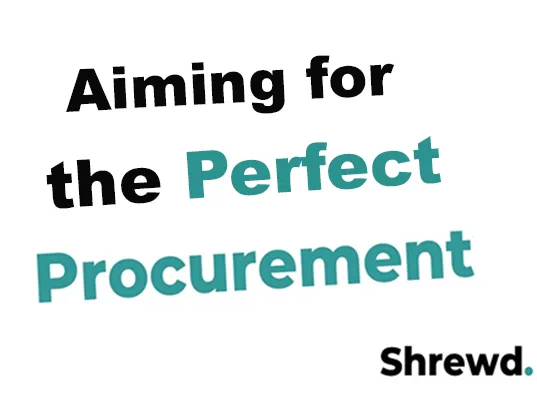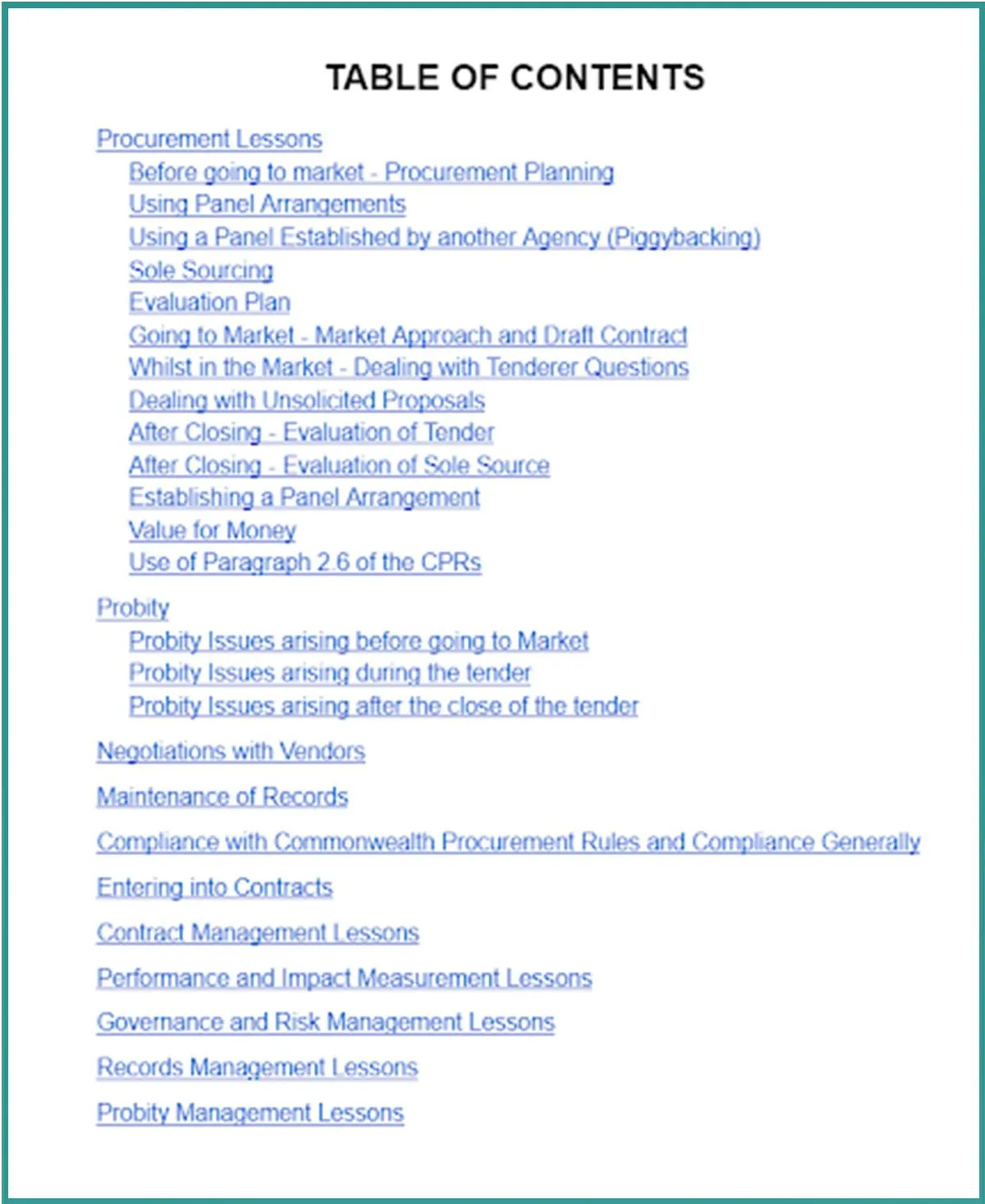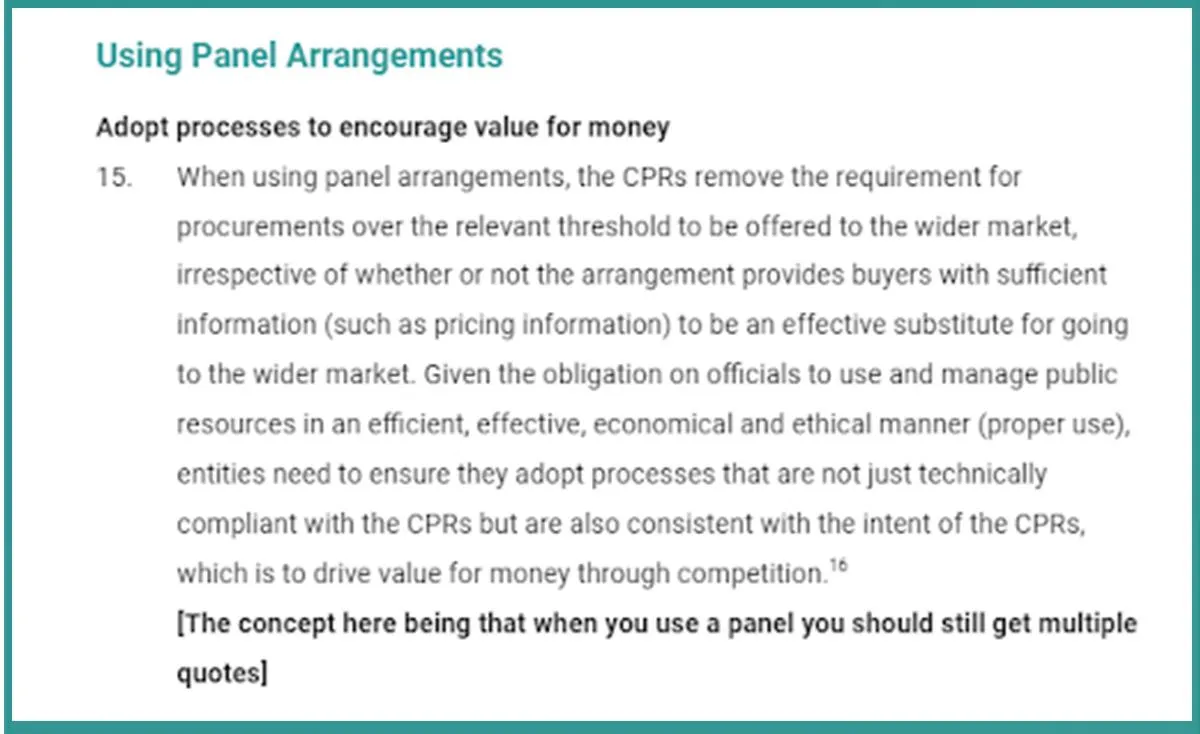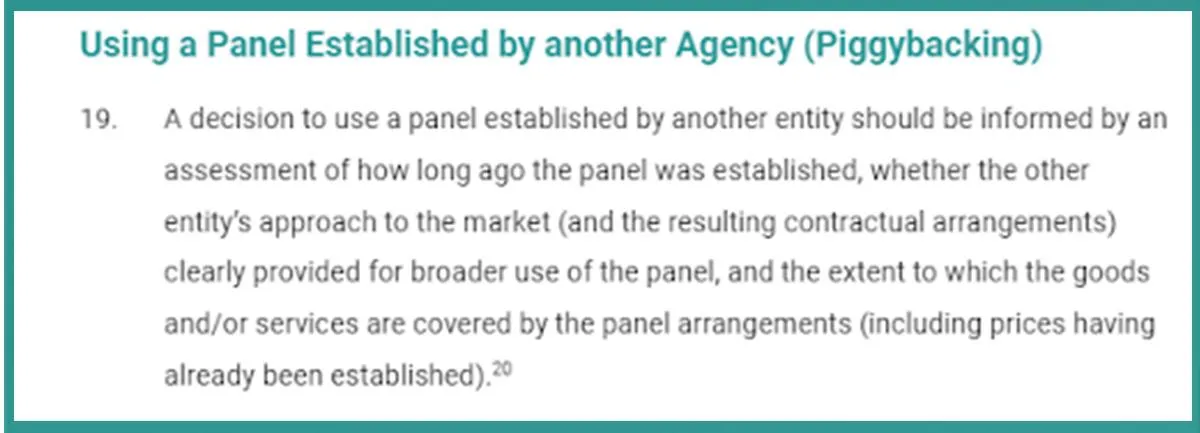Aiming for the Perfect Procurement for Commonwealth Projects: Why It Matters

Wouldn’t you want to get the most out of your hard-earned money when you spend it? Of
course you would want to, and the same is true for the Commonwealth when the Commonwealth decides to spend money.
Procurement by the Commonwealth (i.e. the Commonwealth spending ‘its’ money) matters because it gives assurance to the parliament, and as a result to the public, that public funds (i.e. our taxes) are being used effectively, efficiently, economically and ethically (in other words the Commonwealth is not ‘wasting’ the money when it decides to spend it).
To ensure that the Commonwealth spends its money appropriately there are rules that it must follow… helpfully many of these rules are set out in the Commonwealth Procurement Rules.
Understanding the rules of procurement (and following them to a “T”) gives you (the relevant department or agency) the peace of mind that if and when the ANAO comes knocking they will congratulate you for a job well done (well getting a pat the back from the ANAO might be wishful thinking but at least they won't have grounds to criticise you/ your procurement.
So, what makes (or breaks) a procurement process? And what are the best practices to take to undertake the perfect procurement?
Key Takeaways
Abiding by the Commonwealth Procurement Rules ensures that your entity has the best chance of obtaining value for money.
The ANAO’s audit objectives focus on determining if value for money was achieved by reviewing the entire tender process, seeing if the agency had fit-for-purpose frameworks and processes, seeing if probity was maintained and also examining contract management post contract award.
We have some key lessons or tips and tricks that you can download at the end of this article to help you take aim at trying to undertake the perfect procurement (or you can just download it here).
Procurement and Value for Money - What’s the Big Deal?
Spending public money so that the Commonwealth government can buy goods, services, capability, solutions, IT equipment, software, hardware (or whatever else it needs) i.e. ‘procurement’, is one of the main activities of any government.
Public resources come from the taxes collected from its population, and as public servants, we must ensure that public funds are used and spent effectively and efficiently.
The Department of Finance and ANAO have provided reports that highlight:
- from 2009-10 to 2018-2019, relevant entities (i.e. Commonwealth department and agencies) had entered into contracts with a total value of $490.8 billion;
- during 2019-2020, relevant entities entered into 81,174 contracts valued at $54 billion;
- during 2020-21, 84,054 contracts were entered into with a value of $69.8 billion.
So as you can see, the Commonwealth spends significant amounts of money buying what it needs.
With this much money being spent, transparency and accountability with how that money is spent and what it has been used to buy are paramount. In its 2020-21 Audit Report to Parliament, the Auditor-General commended the improvements made by Commonwealth departments and agencies about compliance with procurement rules and reporting requirements. However, the ANAO also pointed out that agencies still fell short of expectations when it came to the procurement process.
Establishing Value for Money in Procurement Contracts
Because procurement involves spending public resources, the Parliament, the Department of Finance, and the ANAO give greater focus on compliance.
The procurement process (i.e. the actual process used to buy the goods or services) starts when the need to procure goods or services arises and continues up to when the contract with the successful supplier of the goods or services is signed.
However, it’s worth noting that whilst the formal procurement process (ie the act of buying the goods and services) finishes then, the Commonwealth still has a lot to do in terms of ensuring that the successful supplier then actually delivers the goods or services that it has has been contracted to deliver (this is the contract management phase of the process).
During the procurement process Commonwealth departments and agencies need to follow and comply with several Commonwealth policies such as those specified in the Department of Finance’s procurement-connected policies, coordinated procurement (for whole-of-government arrangements) and cooperative procurement (for joint procurement).
These policies at their heart have value for money (i.e. the Commonwealth needs to ensure value for money when undertaking procurement) as the most important aspect when undertaking a procurement and in fact it's fair to say that whether your agency has achieved value for money or not will be a key focus of the ANAO if your procurement process is ever audited.
Value for money, and things to consider to achieve value for money are set out in the Commonwealth Procurement Rules, but it is worth noting that value for money does not just rely on cost or price alone (meaning cheaper is not necessarily better). Entities should also consider the financial and non-financial costs and benefits of the relevant procurement.
Under section 4.5 of the Commonwealth Procurement Rules, you should also consider the following factors (note that this is not an exhaustive list):
- Quality and fitness for purpose
- Supplier's experience and performance history
- The flexibility of the proposal
- Environmental sustainability
- Whole of life cost (cost of ownership)
So whilst value for money is pivotal in the procurement process, you need to be mindful of the fact that price alone does not equal value for money (rather you should also consider the other factors set out above.)
In addition, once the procurement process of purchase the goods or services has been undertaken then the Commonwealth needs to ensure (through effective contract management) that the Commonwealth actually receives the goods or services that it has procured.
So have a guess what the ANAO looks at when undertaking a procurement audit?
That’s right, value for money and contract management.
ANAO Procurement Audit: What’s the Theme?
In 2021-2022, ANAO released nine audit reports about significant procurement. If you look at each report, you will notice that the objectives of the audits focus on two main areas:
- Value for money; and
- Effectiveness of the management of contracts (contract management).
As expected, the audit findings reported by ANAO revolve around compliance (or non-compliance) to the procurement rules, especially when it comes to establishing value for money.
Audit Findings Theme #1: Failure to establish value for money
Procurement audits are generally concerned with examining whether value for money (as defined by the CPRs) was achieved or not. Specifically, the ANAO looks at the procurement process, which includes.
(1) approach to market, tender evaluation and supplier selection,
(2) fit-for-purpose frameworks and processes, and
(3) completion and compliance with the terms of the contract.
As examples, the following audit findings were noted in relation to various procurements:
DISER’s failed to establish value for money on its Entrepreneur Programme because of its tender selection process and failure to treat tenders and evaluate tenders received equitably.
The National Capital Authority has failed to establish value for money because of its “insufficient use of open and competitive procurement process”.
The Department of Defence’s procurement process of Six Evolved Cape Class Patrol Boats has largely demonstrated value for money, and has established fit-for-purpose contracting arrangements and has largely established fit-for-purpose governance arrangements.
The DAWE’s RLP Program’s procurement process largely complied with the Commonwealth Procurement Rules by following the required content and timing requirements for approaches to market and by following the approved procurement plan.
Audit Findings #2: Effectiveness of the Management of Contract (including contractors)
In addition to establishing value for money, another theme we see in ANAO’s audit reports is the effectiveness of contract management.
Each contract is unique in that two contracts may require the same type of goods or services, but the terms will surely be different. No matter how good is your procurement process, if contracts are not managed properly, value for money is not achieved.
Following this, some of the audit findings ANAO has noted are as follows:
- DISER’s contract management and performance framework are inadequate to cover the provisions for on-time delivery of services, reporting of potential conflict of interests, provision for terms of payments, and assessment of delivery partner performance.
- The Department of Home Affairs’ Civil Maritime Surveillance Services Contract was not managed properly. There were 40 revisions which drastically changed the duration and the cost of the contract. Additionally, ANAO has noted that contract managers were not properly trained and did not have the appropriate experience to oversee the completion of the contract.
- The Department of Defence’s management of contractors were “partly fit-for-purpose”, and the implementation of SPSF Policy 12, Policy 13, and Policy 14 was inconsistent. On the contrary, the DVA has established processes for the monitoring and management of contractors following the same SPSF policies.
Other Audit Focuses
A dedicated section for Transparency and Accountability is provided in the Commonwealth Procurement Rules (section 7.1). Transparency and Accountability involve maintaining an appropriate record of documentation and complying with the mandated reporting requirements.
On this point, the ANAO reported (when conducting an audit into the National Capital Authority) that the NCA’s audited procurement activities have poor transparency and record keeping - specifically the ANAO said:
The NCA’s insufficient use of open and competitive procurement processes, non-compliance with the CPRs and poor transparency and record keeping means it cannot demonstrate value for money across its procurement activities.
This also includes non-compliance with the Austender reporting requirements specified in the CPRs.
Other audit findings revolve around fulfilment of contract terms, probity checks and use of probity advisors, competency and effectiveness of procurement and contract managers, and conflict of interest of probity managers and other officials responsible for decision making.
How to “ace” your procurement so you survive an ANAO audit
The ANAO has already published their 2022-2023 Annual Audit Work Program, and as expected, part of their key focus areas include procurement and contract management and proper use and management of public resources (aka value for money).
So it's all well and good to know what the ANAO is going to audit this year.. But how can their past audits be of assistance to you?
The question is, what can you learn from the ANAO’s past audits into procurement so that you don't make the same mistakes as other Commonwealth agencies?
Theoretically this is easy - what you can do is look at all the other points (or criticisms) that the ANAO has levied against agencies when the ANAO has audited the relevant procurement process/ agency.
All you have to do is wade through all the procurement audit reports undertaken by the ANAO (you can find these on the ANAO website) then extract all the key procurement audit findings then group them up so that you have an intelligent compilation of key audit issues found by the ANAO.
Now lucky for you we have done that!
In the document that you can download below we highlight all the KEY LESSONS or KEY ITEMS that the ANAO has focused on, or criticised Commonwealth entities for not following or for not doing, when those Commonwealth entities undertook their various procurement activities.
We have captured all of those lessons in ONE DOCUMENT.
Also we have grouped all the lessons together so that you can simply find the procurement step or stage that you want to know more about (e.g. preparing market documents, value for money, negotiating with suppliers, procuring from a panel) and you will be able to see all the key issues that the ANAO has raised in relation to that step or activity!
So our thinking is that if you know what the ANAO has criticised other agencies for doing or not doing, then this will go a long way to helping you avoid those pitfalls!
Have a look at the table of contents:

Some examples from the document can be found below:

And another one:

To get a copy of this FREE PDF all you have to do is enter your email address, and we’ll email it straight to you.
Worried about spam emails? We hate it too. No need to worry about bombarding you with emails - we won’t.
Now go plan that perfect procurement!
If you need any assistance please feel free to get in touch.
Related: Our Procurement Assistance Service

Simon and Anna Zarifeh
We set out what we have learnt from nearly 40 years of combined experience assisting the Commonwealth with large projects and ICT procurements.
Question? Get in touch!

1800 SHREWD
info@shrewd.com.au
Our BuyICT Profile
The Contract Company Pty Ltd tradings as Shrewd Services.
Procurement
Commercial
Negotiation
Vendor Management
Contract Management
Probity
1800 Shrewd
info@shrewd.com.au
Our BuyICT Proflle
The Contract Company Pty Ltd trading as Shrewd Services

